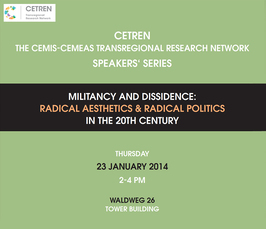"Militancy and Dissidence: Radical Aesthetics & Radical Politics in the 20th Century"
CETREN - The CEMIS-CEMEAS Transregional Research Network Speakers' Series 2014
- Datum: 23.01.2014
- Uhrzeit: 14:00 - 16:00
- Vortragende: Yi Zheng (The University of New South Wales)
- Yi Zheng (PhD, The University of Pittsburgh) is Senio Lecturer and Convenor of Chinese Studies at the University of New South Wales.
- Ort: Waldweg 26, Tower Building
- Raum: Room 6.103 (Level 6)

For more details please contact vdvoffice(at)mmg.mpg.de.
The late British historian Eric Hobsbawm characterized the twentieth century as the “Age of Extremes,” highlighting its unprecedented scale of destruction and violence (1996). Extremism, however, was not only the hallmark of the century’s totalitarian political projects, but also a recurrent feature of its radical literary and artistic movements, from the various avant-gardes of the first half of the century to the diverse aesthetic trends and experiments of its second half.
Whether in the field of politics or that of the arts, the radical impulse was about intervening in an immediate, definitive and transformative manner. In this, its proponents were given to violence, the idea of shattering the existing systems, norms,
and conventions, to makre space for the new: new subjects, new forms of culture, new communities. This desire for total
transformation at times made allies of the two, but it also set them against one another.
This talk will outline the trajectory of a project which investigates literary and intellectual militancy and dissidence in Germany and China in the last two thirds of the twentieth century, with a particular emphasis on the Antagonism and mutual attraction between aesthetic and political radicalism. It will discuss the motivations and ideas behind the trajectory and its methodological implications. The key questions will be: How can we account for intellectual historically this remarkable alignmenht on a transnational scale, and what brings about its particular intensification and virulence in the twentieth century?